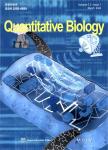Building digital life systems for future biology and medicine
作者机构:MOE Key Lab of Bioinformatics and Bioinformatics Division of BNRISTDepartment of AutomationTsinghua UniversityBeijing 100084China Center of Synthetic and Systems BiologyTsinghua UniversityBeijing 100084China School of Life Sciences and School of MedicineTsinghua UniversityBeijing 100084China
出 版 物:《Quantitative Biology》 (定量生物学(英文版))
年 卷 期:2023年第11卷第3期
页 面:207-213页
核心收录:
学科分类:0710[理学-生物学] 0809[工学-电子科学与技术(可授工学、理学学位)] 08[工学]
基 金:partially supported by the National Natural Science Foundation of China(NSFC)(Nos.61721003 and 62250005) the National Key R&D Program of China(No.2021YFF1200900) Tsinghua-Fuzhou Institute for Data Technology(No.TFIDT2021005)
主 题:digital life systems digital twin aritificial intelligence precision medicine
摘 要:The rapid development of biological technology (BT) and information technology (IT) especially of genomics and artificial intelligence (AI) is bringing great potential for revolutionizing future medicine. We propose the concept and framework of Digital Life Systems or dLife as a new paradigm to unleash this potential. It includes the multi-scale and multi-granule measure and representation of life in the digital space, the mathematical and/or computational modeling of the biology behind physiological and pathological processes, and ultimately cyber twins of healthy or diseased human body in the virtual space that can be used to simulate complex biological processes and deduce effects of medical treatments. We advocate that dLife is the route toward future AI precision medicine and should be the new paradigm for future biological and medical research.



